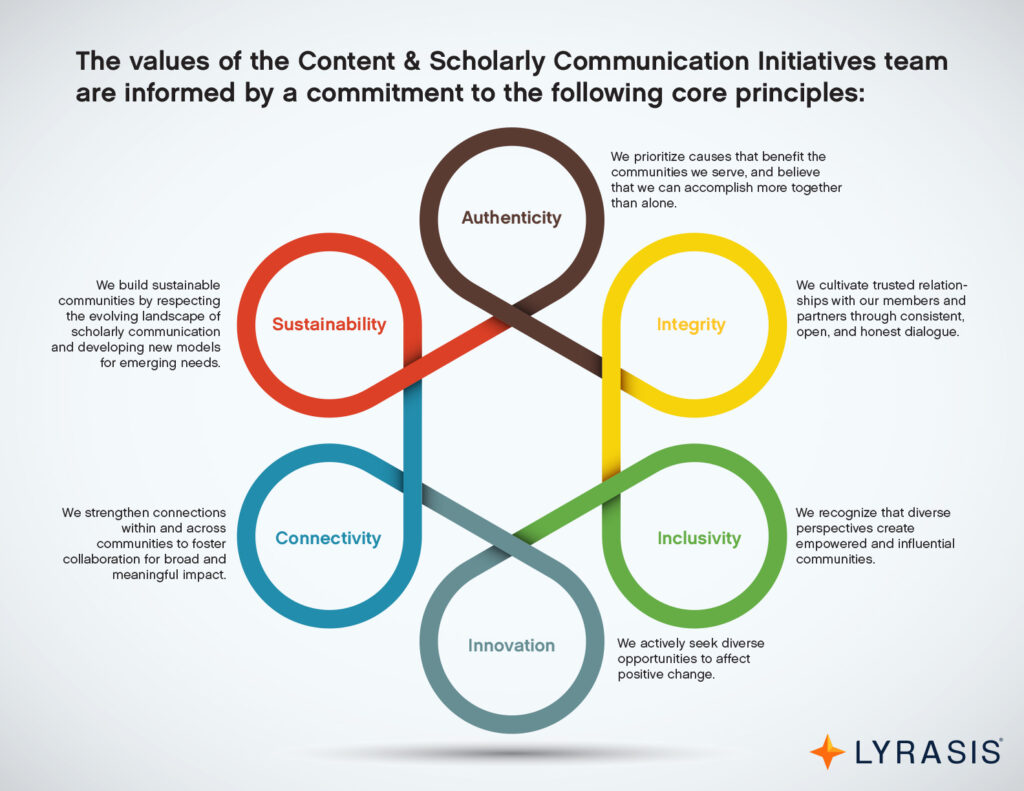Much like the member libraries we serve, the work of the LYRASIS division currently known as Content and Scholarly Communication Initiatives (CSCI) continues to evolve. Over the past year, during an unprecedented worldwide health crisis that affected all our lives in unimaginable ways, the CSCI team took a moment to pause and codify our values and principles to better inform the work we undertake on members’ behalf every day. What emerged from our discussions and data analysis was at once immediately and professionally affirming and a roadmap for the future.
Our goal was to evaluate the fundamental bedrock of what we do and why. In essence, we asked ourselves: What value do we bring to the LYRASIS membership and the wider gallery, library, archive, and museum (GLAM) community?
Each of the six values articulated below represent distinct yet interconnected ways that we interact with members, content providers, and the scholarly communication ecosystem as a whole.

- Authenticity: We prioritize causes that benefit the communities we serve and believe that we can accomplish more together than alone.
- Integrity: We cultivate trusted relationships with our members and partners through consistent, open, and honest dialogue.
- Inclusivity: We recognize that diverse perspectives create empowered and influential communities.
- Innovation: We actively seek diverse opportunities to affect positive change.
- Connectivity: We strengthen connections within and across communities to foster collaboration for broad and meaningful impact.
- Sustainability: We build sustainable communities by respecting the evolving landscape of scholarly communication and developing new models for emerging needs.
Across these six values, three overarching themes materialized: Trust, community, and a commitment to managing constant change. First, we must have the trust of both members and content providers to affect positive change and foster collaboration, whether through traditional avenues of licensing opportunities for purchased content upon which many members rely, or through new explorations into sustainable Open Access (OA) and open research infrastructure programs and initiatives. Secondly, we seek to cultivate community in all of our endeavors. These communities exist in a variety of forms:
- Existing subscriber communities with ongoing needs for maturing licensing terms and publisher services;
- New communities supporting open frameworks, such as the LYRASIS Open Access Community Investment Program (OACIP) and the LYRASIS United Nations Sustainable Development Goals Fund;
- And national and international communities that provide infrastructure and support for scholarly communication, such as the ORCID US Community, the DataCite US Community, and our work with the International Coalition for Library Consortia (ICOLC).
Underlying the themes of trust and community, however, is our commitment to managing constant change. Perhaps nowhere is this more evident than in the dollars that members are directing to LYRASIS CSCI programs. Over the past seven years, many long-standing subscriptions have been cancelled due to library budget pressures, yet a careful analysis of the money spent through LYRASIS provides evidence that these dollars have not completely disappeared. Rather, financial support is slowly but consistently transitioning from commercial paywalled publishing programs to OA and non-profit ones.
GLAM information professionals are well familiar with the pressure for open content and open infrastructure, as it is only one of the most recent exemplars of the constant change we have managed since the paradigm shift from print to electronic. The CSCI team recognizes this constant change, and our values seek to help guide GLAM institutions through the rocky yet thrilling waters of scholarly communication in the 21st century.
Ultimately, the CSCI team’s values and principles articulation can be best summarized thus: We can accomplish more together than alone. With authenticity and integrity, we seek to create inclusive connections for innovation and sustainability.
